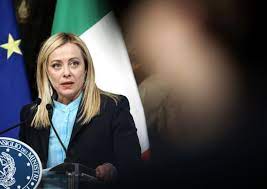Italy’s Meloni defends bank windfall tax raid

Rome: Prime Minister Giorgia Meloni on Wednesday defended the decision to impose a surprise windfall tax on profits at Italy’s banks after the government watered down the plan following a market rout.
The economy ministry clarified late on Tuesday that the 40% windfall tax, a one-off measure which targets gains from banks’ higher interest rates, would not amount to more than 0.1% of their total assets.
While other European countries, such as Spain and Hungary, have introduced windfall taxes on banks, analysts said Italy’s initial announcement late on Monday caught the market unawares, damaging confidence and raising fears of further measures across Europe.
Meloni, who took office last October, said it was vital for banks to behave as correctly as possible, given the difficult economic circumstances, with weak growth, high inflation and rising interest rates.
The government “has approved several measures, the most important of which is the taxation on banks’ unjust margins,” Meloni said in a Facebook video, her first public comment since the decision was announced.
Analysts at UBS said the cap announced by the economy ministry meant the tax would have an aggregate impact of 1.9 billion euros ($2.1 billion).
The initial impact of the measure before the cap had been seen at below 3 billion euros, according to sources in Rome and analysts’ calculations.
Citi analysts had estimated on Tuesday that the windfall tax could bring as much as around 0.5% of total 2023 risk-weighted bank assets (RWAs) into Italian state coffers.
Shares in Italian lenders such as Intesa Sanpaolo (ISP.MI), Banco BPM (BAMI.MI) and UniCredit (CRDI.MI) rebounded between 2.6% and 4.9%, while FinecoBank (FBK.MI) added some 6%.
UBS said the expected “earnings erosion” for Italian retail banks was likely to range between 6% for UniCredit to 15-16% for Banco BPM.





